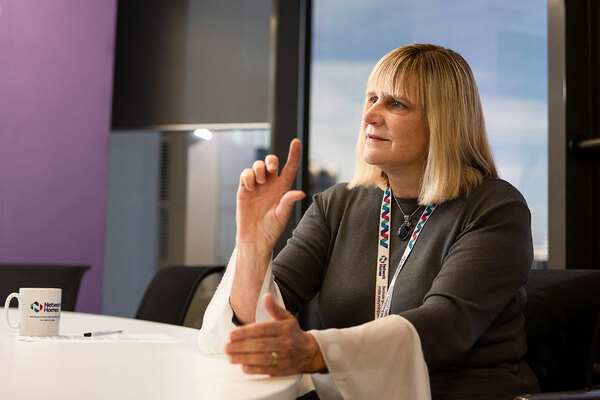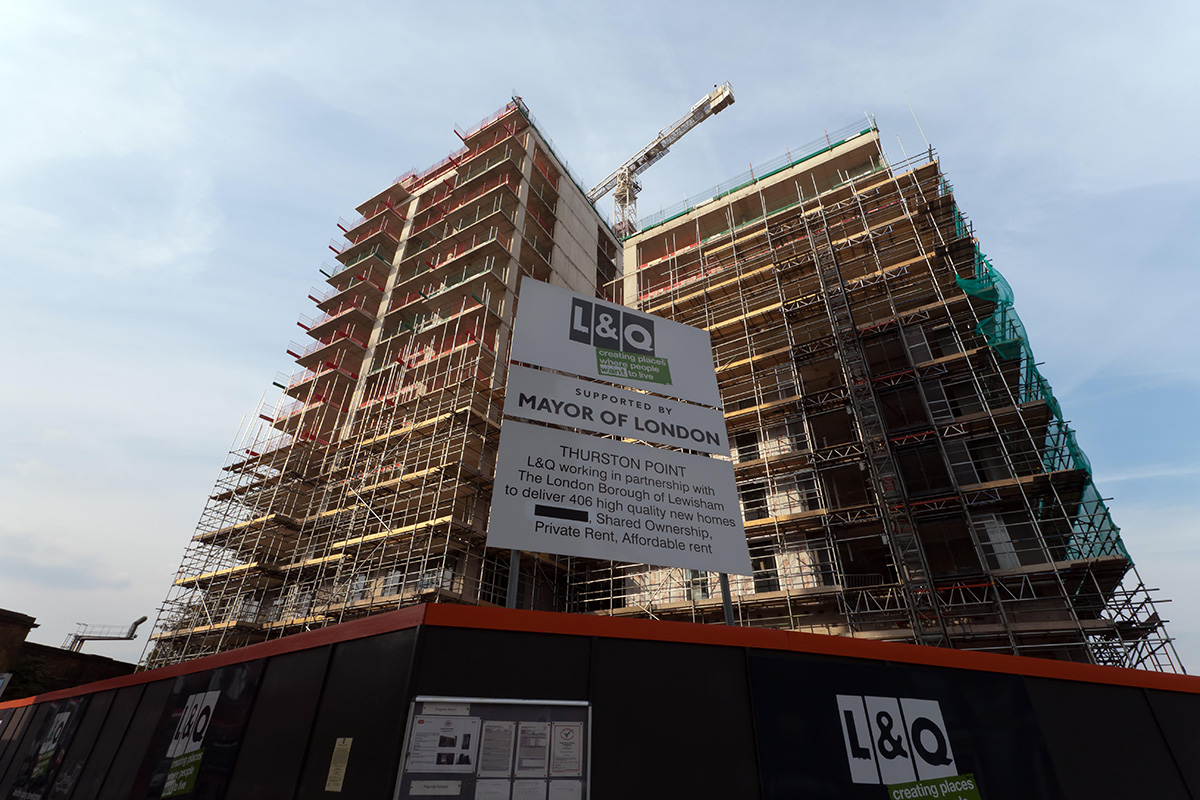You are viewing 1 of your 1 free articles
Waqar Ahmed: navigating through the crisis
Dominic Brady speaks to Waqar Ahmed, group finance director at L&Q, as he plots the landlord’s route through the financial fall-out of COVID-19
Waqar Ahmed got the top job of finance chief at L&Q in the middle of an economic crisis. It was 2008 and sub-prime mortgages had imploded in the US, causing shockwaves across the global economy.
When Inside Housing caught up with Mr Ahmed recently it was over video call, because we are in the middle of another crisis. As of August, the UK is in the worst recession on record. The economy shrank by more than 20%. This will have a profound effect on everyone, and the housing sector is far from immune.
“When you go back to the financial crisis of 2008, that was about 10% of the economy that was impacted – it’s nowhere near the significance of what we’ve seen in the past few months”
We wanted to talk to Mr Ahmed – group finance director at the 95,000-home association – to find out about what this means for one of the largest housing associations in the country. Despite the enormity of 2008 and the years of austerity that followed, Mr Ahmed cautions that the current crisis is much worse.
“When you go back to the financial crisis of 2008, that was about 10% of the economy that was impacted – it’s nowhere near the significance of what we’ve seen in the past few months,” he cautions.
It did provide lessons though, and Mr Ahmed says that businesses have been applying them to the current situation.
“We have seen a lot of organisations managing stability in a very volatile time which, 10 years ago, just would not have happened,” he says.
Despite the economic uncertainty, the landlord achieved an increase of 45% in its operating surplus and bolstered its liquidity by selling £300m of short-term debt to the Bank of England via its Covid Corporate Financing Facility. Inevitably, the pandemic has impacted its developments; completions crashed by 78% in the first quarter of 2020/21, compared to the same period last year.
Back in 2008, L&Q reacted by shifting the business so it was no longer reliant on government grant to build homes. This meant taking on more risk, driving the business to become more efficient and changing the way it raised finance – a move that has seen the landlord rack up £2.4bn in the debt capital markets.
The pandemic will have a similar sea-change effect on how L&Q works, Mr Ahmed predicts. He remains committed to the group’s ambitious target of building 100,000 new homes over 10 years. But how those homes are delivered may change.
“There’s a sustainability agenda, design and quality agendas and issues of speed. If we can deliver all of those through MMC, then where is the business case against it?”
“The way we will do that will be more joint ventures. They may be with equity investors, housing associations, local authorities, banks, investors – and on development schemes with house builders,” he says.
The way those homes are built may also change. “We are looking now at how we can minimise disruption. How do we build in the future using modern methods of construction [MMC] and other more advanced digital technologies so that supply chains aren’t as susceptible to disruption?” he asks.
Mr Ahmed considers MMC to be a viable solution to many pressing issues that the sector is facing. He says: “There’s a sustainability agenda, design and quality agendas and issues of speed. If we can deliver all of those through MMC, then where is the business case against it?”
Mr Ahmed thinks factory-built homes offer the potential to overhaul the way building has been done for hundreds of years – and the benefits have been underlined during the pandemic, during which construction sites have closed as a result of social distancing concerns.
“It’s in the embryonic stages. I’m excited to see where it could take us, but it can’t just be L&Q; it has to be other associations and it has to be fully supported by the banks, the mortgage market and the insurance market,” he notes.
Mr Ahmed thinks the emergence of MMC could be one of the most significant developments he has seen in more than 20 years in social housing. But the biggest change he identifies is more about the identity of housing associations.
“The transition from where the sector was in the 1990s to where it is now is just brilliant to see,” he says.
“When I joined L&Q in 1998, we did our first regeneration scheme in Edmonton in partnership with another association and it was £18m – we couldn’t manage it on our own!” he recalls. “Now we’re building 15,000 homes – a completely new town – in Barking Riverside.”
"Providing social housing requires grant or cross-subsidy – you cannot get market returns out of social housing”
This mammoth project will use £500m in Section 106 funds and will be completed over the next 15 years.
In the early days, housing associations were a sort of “carry-on” from local authority housing, he says, with developments coming mainly from Section 106 deals and stock transfers. Mr Ahmed suggests that associations were run more like a “movement” than a business.
“Now you’ve got roughly £90bn of debt finance, huge amounts of grant and housing associations competing with house builders to buy land and build homes. It’s totally different.”
Mr Ahmed says the recent spate of associations accessing debt capital markets at increasingly attractive rates is testament to the sector and he sees no let-up in the interest coming from investors – especially those across the globe.
“You will get more investors wanting to come into this sector, more private placements – we have hardly tapped into North America. Far East Asia is excited about UK social housing and the British establishments have already supported this sector for decades,” he explains.
“My parents went bankrupt and the house was repossessed. That’s when it dawned on me the impact housing can have on your life”
And what about the potential of negative interest rates? “If interest rates become negative it could create some disruption; you lose some liquidity, lenders pull out and go to more risky industries, but then supply and demand will step in and spreads will adjust themselves,” he says.
The impact will be felt by all English associations that are required to hold 18 months’ worth of liquidity – as required by the Regulator of Social Housing – “but that’s a cost we’ll have to accept”, he says.
Mr Ahmed enthuses over the UK social housing sector and firmly believes it is a force for good – a belief shaped by his own early experiences. The Welsh-raised finance chief experienced first-hand the importance of housing when his family home was repossessed as a child.
Mr Ahmed’s father had a fruit and vegetable shop (“I’ve been doing VAT returns since the age of six,” he recalls). He later went on to have a first role as a trainee accountant at Gwent County Council, and he subsequently worked his way up through the ranks in housing.
Legislation at the time meant that the original leaseholder of a property could be charged for outstanding rent – even if they had sold the property to someone else. Mr Ahmed’s father sold his shop, which was then sold to another buyer, but the freeholder came after the Ahmeds looking for rent arrears on their old property.
“My parents went bankrupt and the house was repossessed,” he recalls solemnly. “That’s when it dawned on me the impact housing can have on your life.”
It is against this backdrop that Mr Ahmed is keen to ward off entities looking to make market returns from the sector.
When asked about John Lewis’ announcement that it was considering converting stores to affordable rented housing,
Mr Ahmed is keen to clarify the original purpose of social housing.
“My view is that there is a massive housing crisis and we need to build more homes – the more equity and capital that comes into the sector, the better. But people should recognise what the sector is and what it aims to do. Providing social housing requires grant or cross-subsidy – you cannot get market returns out of social housing,” he says. “So the options are you do it because you care or… I don’t see any other option. Whether it’s John Lewis, the big private equity investors, the more the merrier, but they should accept that this is not a sector to make market returns from.”
With the impending economic fall-out from the coronavirus pandemic looming ominously on the horizon, Mr Ahmed is determined to take an optimistic approach, hailing the pandemic as an “opportunity” to explore new ways of working.
The finance director wants L&Q to show the same flexibility after COVID-19 that it did in the wake of the 2008 financial crash.
Behind Mr Ahmed as we speak is a Muhammad Ali poster, reading, “Float like a butterfly, sting like a bee.” L&Q will need some Ali-esque agility to navigate the choppy waters ahead. How this is achieved will be showcased in next year’s corporate plan, which Mr Ahmed is helping to shape – a far cry from the days of VAT returns in his dad’s shop.
Sign up for the IH long read bulletin
Already have an account? Click here to manage your newsletters














